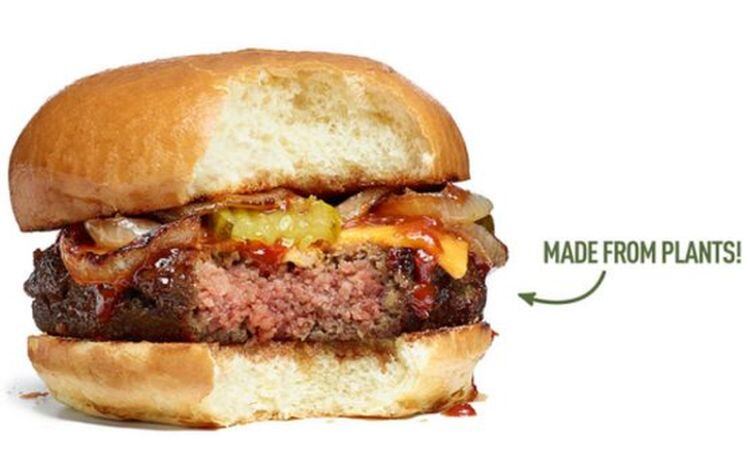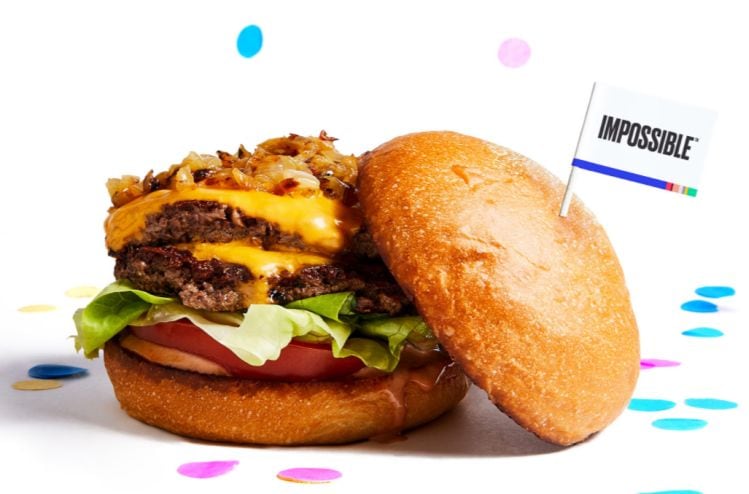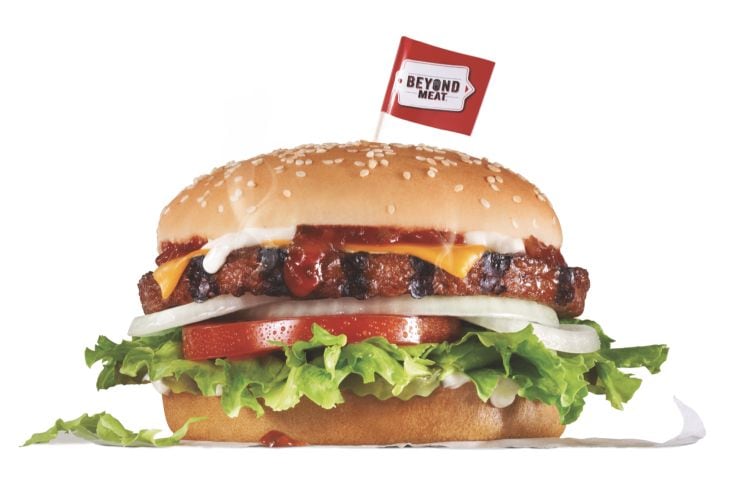“Impossible Burger fans told us loud and clear they wanted a gluten-free burger that was at least as nutritious as meat from animals,” said Dr. Sue Klapholz, VP of nutrition and health at Impossible Foods.
In the new recipe (see box below) – based on feedback from consumers who self-identify as heavy meat eaters - Impossible Foods has also reduced salt, replaced some coconut oil with sunflower oil to reduce saturated fat, and ditched konjac gum and xanthan gum.
Aside from the sunflower oil and soy protein concentrate, additional ingredients not in the original formulation including modified food starch and methylcellulose (which are also used in the plant-based Beyond Burger), cultured dextrose (a popular preservative), vitamin C and vitamin E.
The new formulation – which debuted at the International Consumer Electronics Show this week and will be on offer at high-end restaurants including Chef Tae Strain’s Momofuku CCDC in Washington DC and Chef Traci Des Jardins’ Jardinière and School Night in San Francisco – will be available to all restaurants in the US from February 4.

“In the new recipe, much of the texture comes from soy protein. The original Impossible Burger contained wheat and soy; the next-generation burger contains soy but no wheat. So we have removed an allergen.”
Impossible Foods founder and CEO Dr Pat Brown, who announced the Impossible Burger 2.0 at the 2019 Consumer Electronics Show in Las Vegas, where attendees have the chance to sample the revamped burgers from a food truck parked near the Las Vegas Convention Center.
The cow simply can’t compete
Based on aggregated blind taste testing data from 1,000 consumers+ who consumed burgers without condiments or buns, the new recipe matched regular beef burgers made with conventional ‘80/20’ ground beef from a major grocery chain on likeability, said the company, which debuted the Impossible Burger in July 2016 at Momofuku Nishi in New York and has since introduced it to 5,000+ restaurants across the country from White Castle to Umami Burger.
“In addition to taste tests with consumers conducted by independent researchers, Impossible Foods’ own flavor scientists and sensory experts conduct at least 100 internal taste tests per week,” said Impossible Foods’ Chief Science Officer Dr David Lipman. “We are relentless in our quest to consistently improve the Impossible Burger. The cow simply can’t compete.”
The new recipe is optimized for any ground meat dish
As for functionality, the original Impossible Burger (which launched in 2016) was custom-designed for flat-top cooking at restaurants, said Impossible Foods, which is gearing up for a retail launch later this year.
“By contrast, the new recipe is optimized for any ground meat dish, from dumplings to sloppy joes. It can be steamed, seared, or sizzled on slats over an open flame. It retains its texture and juiciness throughout the cooking process.”
Could color additive petition delay the retail launch of the Impossible Burger?
Impossible Foods received a letter from the FDA last summer confirming the agency has no additional questions that challenge the company’s determination that its star ingredient – soy leghemoglobin (‘heme’), which it says "makes meat taste uniquely like meat" – is generally recognized as safe (GRAS).
The FDA also noted that soy leghemoglobin could be considered a color additive in some potential future applications, prompting Impossible Foods to file a color additive petition with the FDA on November 5, 2018.
We remain on track with the retail launch timeline
So is the heme serving as a color additive in the uncooked version of the Impossible Burger - which is slated for launch in the retail market later this year - and if so, could the need to secure FDA approval for the petition delay the launch?
Or might the fact that the FDA has already reviewed the company’s data on heme in the course of reviewing its GRAS determination speed up the process (color additive petitions can take up to two years to review)?
Asked whether the retail launch is contingent upon approval of the color additive petition, and whether it might be delayed, chief communications officer Rachel Konrad told FoodNavigator-USA: “We have announced our intention to launch in retail outlets in 2019, and we remain on track with that timeline.”
The question of which other specific uses might qualify as color additive uses is more ambiguous
She added: “While it is clear that, as currently used in our products [which are sold cooked, in restaurants], heme does not qualify as a color additive, the question of which other specific uses might qualify as color additive uses is more ambiguous. We voluntarily submitted a color additive petition for heme so that the FDA would have full information and we would have maximum flexibility as our products and business continue to evolve.”
Pressed further, she said: "There are many ways Impossible Foods could enter retail, and there is ambiguity about which if any of them might raise color additive issues… under any circumstance, our plan is of course to comply with all food-safety regulations.”

A protein found in nodules attached to the roots of nitrogen-fixing plants such as soy that is similar to myoglobin and hemoglobin (which make blood look red), leghemoglobin is what "makes meat taste uniquely like meat," according to Impossible Foods, which produces it via a genetically engineered yeast – the DNA of which has been retooled to produce leghemoglobin.
The yeast feeds on sugar from plants and produces leghemoglobin with a fraction of the environment footprint of field-grown soy (the final product contains no live yeast).

The Impossible Burger is the brainchild of Stanford biochemist and genomics expert Pat Brown, PhD, MD, who has described industrialized meat production as "the most destructive technology on Earth."
At Impossible Foods, the key components of meat have been identified, characterized and sourced from plants such as soy and potatoes, and processed using high-moisture extrusion and other techniques in order to meet precise functional, taste and textural criteria.
Impossible Burger OLD ingredients list: water, textured wheat protein, coconut oil, potato protein, natural flavors, 2% or less of: leghemoglobin (soy), yeast extract, salt, soy protein isolate, konjac gum, xanthan gum, thiamin (Vitamin B1), zinc, niacin, vitamin B6, riboflavin (Vitamin B2), vitamin B12.
Impossible Burger NEW ingredients list: Water, soy protein concentrate, coconut oil, sunflower oil, natural flavors, 2% or less of: potato protein, methylcellulose, yeast extract, cultured dextrose, food starch modified, soy leghemoglobin, salt, soy protein isolate, mixed tocopherols (vitamin E), zinc gluconate, thiamine hydrochloride (vitamin B1), sodium ascorbate (vitamin C), niacin, pyridoxine hydrochloride (vitamin B6), riboflavin (vitamin B2), vitamin B12.
The new version“has as much bioavailable iron and high-quality protein as a comparable serving of ground beef from cows,” says the company. “In addition, it has no cholesterol, 14g total fat and 240 calories in a quarter-pound patty (a quarter-pound beefburger has 80mg cholesterol, 23g total fat and 290 calories).”




